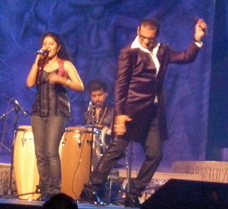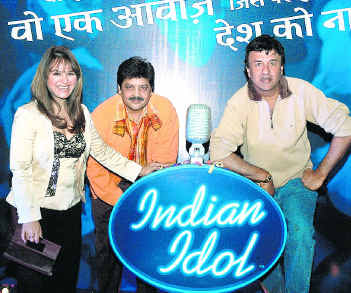 Finally the 2010 NABC came to an end on Sunday July 11th at the Atlantic City convention center in New Jersey with a “blow out” performance by Abhijeet. Although his mockery of Bengali culture was not well appreciated by many Bengalees who slowly drifted away from the hall (which was not liked by the singer at all), his performance was just what was expected of a Bollywood performer – entertaining but nothing extraordinary. However, people who came to the conference went back with memories – some of which may not be very pleasant but I would think most of them would be happy memories. Memories of the wonderful performances by Sahaj-ma and Utpal Fakir, Kaivalya Kumar and few others, memories of meeting friends, those long adda sessions and the World Cup finals.
Finally the 2010 NABC came to an end on Sunday July 11th at the Atlantic City convention center in New Jersey with a “blow out” performance by Abhijeet. Although his mockery of Bengali culture was not well appreciated by many Bengalees who slowly drifted away from the hall (which was not liked by the singer at all), his performance was just what was expected of a Bollywood performer – entertaining but nothing extraordinary. However, people who came to the conference went back with memories – some of which may not be very pleasant but I would think most of them would be happy memories. Memories of the wonderful performances by Sahaj-ma and Utpal Fakir, Kaivalya Kumar and few others, memories of meeting friends, those long adda sessions and the World Cup finals.
But the people who went back with a bad taste in their mouth (no, I am not talking about the food served by Shahnawaz) were the people who came all the way to showcase their talent through dance, drama and music. These people paid group registration for their show, paid individual registration fees for their entire troupe and spend big dollars to bring their show with the hope to share with their Bengali friends who came from around the country. Continue reading

 The reality TV show “American Idol” has triggered a new trend – Idol search! TV channels all over the world are searching for idols – or talents. This search is not only limited to the television screen, but it has also proliferated onto the stage in various forms. Although the primary objective of this kind of shows is to screen for talent, in reality (excuse the pun) it is nothing but an entertainment show. The excitement, the drama, and the occasional emotional outbursts, are all part of the show. Undoubtedly, such shows do bring many talented men, women and children to the limelight, but is this the right way to do explore talent? In many cases, the exploration turns to exploitation – especially for the young participants. They have to go through a grueling screening process, sustain a tremendous pressure to perform, and then handle a barrage of criticism from the celebrity judges. I know in one dance show, a young girl couldn’t take the judges criticism anymore and had a nervous breakdown resulting in a paralytic fit. In several instances the young competitors sacrifice their education to continue the show. But the tragedy is, in most cases the winner is not judged by the celebrity panel whose criticism these young participants have to encounter, but rather by the audience through cell/mobile phone text messages (SMS). And in this process, the wireless carrier mints money. I am sure the show also gets their share of this income too.
The reality TV show “American Idol” has triggered a new trend – Idol search! TV channels all over the world are searching for idols – or talents. This search is not only limited to the television screen, but it has also proliferated onto the stage in various forms. Although the primary objective of this kind of shows is to screen for talent, in reality (excuse the pun) it is nothing but an entertainment show. The excitement, the drama, and the occasional emotional outbursts, are all part of the show. Undoubtedly, such shows do bring many talented men, women and children to the limelight, but is this the right way to do explore talent? In many cases, the exploration turns to exploitation – especially for the young participants. They have to go through a grueling screening process, sustain a tremendous pressure to perform, and then handle a barrage of criticism from the celebrity judges. I know in one dance show, a young girl couldn’t take the judges criticism anymore and had a nervous breakdown resulting in a paralytic fit. In several instances the young competitors sacrifice their education to continue the show. But the tragedy is, in most cases the winner is not judged by the celebrity panel whose criticism these young participants have to encounter, but rather by the audience through cell/mobile phone text messages (SMS). And in this process, the wireless carrier mints money. I am sure the show also gets their share of this income too.